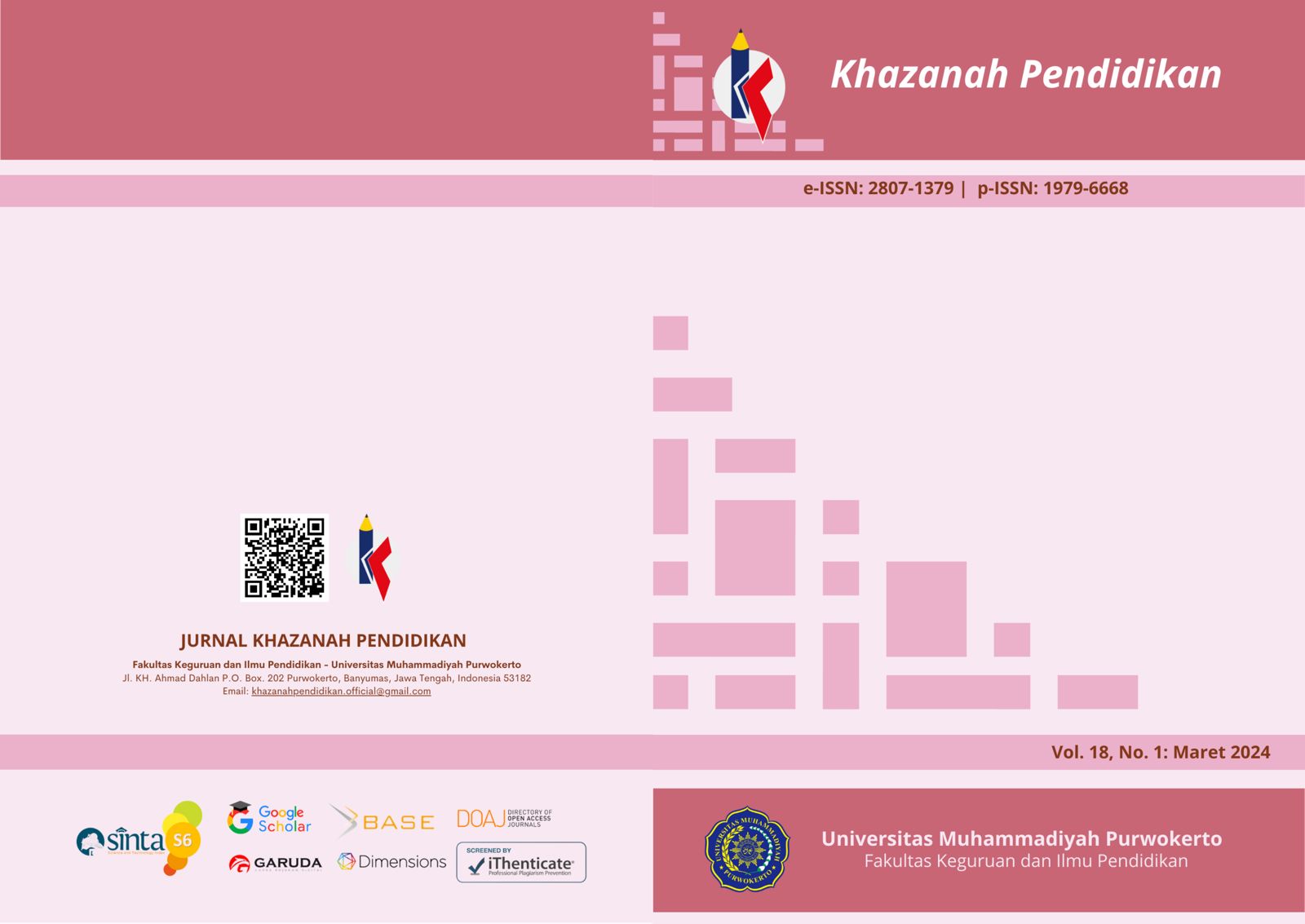PENINGKATAN HASIL BELAJAR PPKN PESERTA DIDIK KELAS II MENGGUNAKAN MEDIA BELAJAR KREATIF DI SDN PAJANG 3 SURAKARTA
DOI:
https://doi.org/10.30595/jkp.v18i1.21680Keywords:
Learning Outcome, PPKN, Creative Learning, Media EducationAbstract
This research aims to improve PPKn learning outcomes using creative learning media for grade 2 students at SD Negeri Pajang 3 Surakarta. The type of research is classroom action research with a design adopted from Stephen Kemmis and Mc. Taggart. The research subjects were 25 class 2 students. The research was carried out in two cycles consisting of planning, action, observation and reflection. Data collection techniques use observation, tests and interviews. From the results of data analysis, the use of creative learning media can improve the learning outcomes of class 2 students. The use of creative media can provide stimulation for students to find out more detailed information about the learning material being studied. The increase in learning outcomes can be proven by the increase in quality in the cognitive domain of the pretest that has been carried out, namely 67.24, increasing to 68.97 in cycle I, then increasing again to 87.58 in cycle II. So it was concluded that through the use of creative learning media there was an increase in the learning outcomes of class 2 students at SD Negeri Pajang 3 Surakarta for the 2023/2024 academic year.References
Alfakih, B. (2023). Kendala-Kendala Dalam Pelaksanaan Penelitian Tindakan Kelas. Jurnal Kreativitas Mahasiswa, 1, 39-47.
Atapukang, N. (2016). Kreatif Membelajarkan Pembelajar Dengan Menggunakan Media Pembelajaran Yang Tepat Sebagai Solusi Dalam Berkomunikasi. Jurnal Media Komunikasi Geografi, 17, 46-52.
Aulia, H. R. (2023, September). Pelatihan Pembuatan Media Pembelajaran Kreatif Di Sd Negeri 01 Purworejo Kecamatan Sragi. Ijocs: Indonesian Journal Of Community Service, 3(3), 54-61.
Dea Kiki Yestiani, N. Z. (2020). Peran Guru Dalam Pembelajaran Pada Siswa Sekolah Dasar. Fondatia Jurnal Pendidikan Dasar, 46.
Firmansyah, A. (2022). Kecenderungan Guru Dalam Menerapkan Pendekatan Student Center Learning Dan Teacher Center Learning Dalam Pembelajaran. Jurnal Guru Indonesia, 2, 33-39.
Fuad Maulana, A. S. (2020). Manfaat Pendidikan Terhadap Perkembangan Karaktermahasiswa Di Universitas Negeri Malang. Seminar Nasional Arah Manajemen Sekolah Pada Masa Dan Pasca Pandemi Covid-19, 41.
Jailani, M. S. (2023, Juli). Teknik Pengumpulan Data Dan Instrumen Penelitian Ilmiah Pendidikan Pada Pendekatan Kualitatif Dan Kuantitatif. Ihsan Jurnal Pendidikan Islam, 1(2), 1-9.
Kurniawati, E. (2022). Penerapan Media Pembelajaran Berbasis Permainan Monopoli Untuk Meningkatkan Prestasi Belajar Ppkn. Pedagogi: Jurnal Pendidikan Dan Pembelajaran, 1-5.
Mahmudah. (2018). Pengelolaan Kelas : Upaya Mengukur Keberhasilan Proses Pemebelajaran. Jurnal Kependidikan.
Prayogi, A. (2021). Pendekatan Kualitatif Dalam Ilmu Sejarah: Sebuah Telaah Konseptual. Historia Madania, 5(2).
Rofi Rudiawan, A. P. (2022). Peran Guru Pendidikan Pancasila Dan Kewarganegaraan . Jurnal Edupedia, 58.
Ruswiyani, E. (2023, July). Penerapan Model Pembelajaran Group Investigation Berbantuan Media Audio Visual Untuk Meningkatkan Hasil Belajar Siswa Pada Pembelajaran Ips Kelas Iv Uptd Sdn 189 Inpres Camba Jawa. Alena Journal Of Elementary Education, 1(2).
Sinta, S. (2021, Januari). Pengaruh Model Pembelajaran Kreatif Produktif Berbantuan Media Visual Terhadap Hasil Belajar Siswa Pada Mata Pelajaran Ipa Di Kelas V. Educate Jurnal Teknologi Pendidikan, 6(1), 1-8.
Werdiningsih, R. (2018, Oktober). Membangun Semangat Nasionalisme Generasi Muda. Majalah Ilmiah Fisip Untag , 1-17.
Wulandari, D. (2021). Pengukuran Dan Penilaian Hasil Belajar. Pustaka Pelajar.
Downloads
Additional Files
Published
Issue
Section
License
Authors who publish with this journal agree to the following terms:
Authors retain copyright and grant the journal right of first publication with the work simultaneously licensed under a Creative Commons Attribution License that allows others to share the work with an acknowledgement of the work's authorship and initial publication in this journal.
Authors are able to enter into separate, additional contractual arrangements for the non-exclusive distribution of the journal's published version of the work (e.g., post it to an institutional repository or publish it in a book), with an acknowledgement of its initial publication in this journal.
Authors are permitted and encouraged to post their work online (e.g., in institutional repositories or on their website) prior to and during the submission process, as it can lead to productive exchanges, as well as earlier and greater citation of published work (See The Effect of Open Access).

Khazanah Pendidikan is licensed under a Creative Commons Attribution 4.0 International License.


